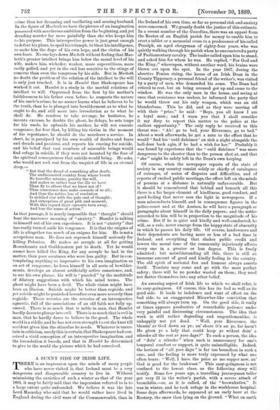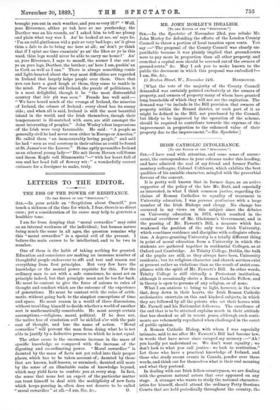A SUNNY SIDE OF IRISH LIFE.
rERE is an impression upon the minds of many people who have never visited it, that Ireland must be a very dangerous and disagreeable country to live in. Without minimising the anxieties of such a winter as that of the year 1881, it may be fairly said that the impression referred to is to a large extent quite unfounded. We believe it was the late Lord Macaulay who said that he would rather have lived in England during the civil wars of the Commonwealth, than in the Ireland of his own time, so far as personal risk and anxiety were concerned. We greatly doubt the justice of this estimate.. In a recent number of the Guardian, there was an appeal from the Rector of an English parish for money to enable him to erect a tablet or a memorial cross to a predecessor of his called Praulph, an aged clergyman of eighty-four years, who was quietly walking through his parish when he encountered a party of Parliamentary cavalry. The leader called upon him to stand, and asked him for whom he was. He replied, "For God and the King ;" whereupon, without another word, his brains were blown out upon the spot. In the year 1867, during the abortive Fenian rising, the house of an Irish Dean in the County Tipperary, a personal friend of the writer's, was visited by a party of men, who demanded his arms. The Dean had retired to rest, but on being aroused got up and came to the window. He was the only man in the house, and seeing at once that resistance was useless, he informed the party that he would throw out his only weapon, which was an old blunderbuss. This he did, and as they were moving off with their "prize," he said : "Boys, you all know I am a loyal man ; and I warn you that I shall consider it my duty to report this matter to the police at the earliest opportunity." The only reply he received to this threat was : " Ah ! go to bed, your Riverence, go to bed." About a week afterwards, he got a note to the effect that he would "find his ould dulcimer' an sich a night alongside the hall-door back agin, if he had a wish for her." Probably it was found by experience that the " onld dulcimer" was more dangerous to the shooter than to the person shot at, and that " she " might be safely left in the Dean's own keeping.
Of course, when the newspaper reports of the state of society in any country consist solely or chiefly of catalogues of outrages, of series of disputes and difficulties, and of reports of excited public meetings, the effect left on the minds of persons at a distance is naturally unfavourable. But it should be remembered that behind and beneath all this there is a far larger element of kindliness, good conduct, and good feeling that never sees the light in newspapers. If a man miseonducts himself, and in consequence figures in the police-court and at the Assizes, he will have a paragraph or paragraphs about himself in the daily papers ; and the notice accorded to him will be in proportion to the magnitude of his crime. But if he is quiet and kindly and well-conducted, he will, as a rule, never emerge from the happy state of obscurity in which he passes his daily life. Of course, landowners and their dependents are having more or less of a bad time in Ireland, and everything that shakes public credit and lowers the moral tone of the community injuriously affects every one in a greater or less degree. This is freely admitted ; but notwithstanding all this, there is still an immense amount of good and kindly feeling in the country. The old spirit of national fun and humour always asserts itself. Tourists may come and go with the most perfect safety ; there will be no powder wasted on them ; they need not flatter themselves into any other belief.
An amusing aspect of Irish life to which we shall refer, is its easy-goingness. Of course, this has its bad as well as its good side. It leads to indolence and want of effort on the bad side, to an exaggerated Micawber-like conviction that something will always turn up. On the good side, it really at times appears productive of remarkable patience under very painful and distressing circumstances. The idea that work is still rather degrading and ungentlemanlike, is unhappily not yet dead. "Well, yere Riveren.ce, the blessin' av God down an ye; an' share it's an ye, for havn't He given ye a lady that could keep ye widout doin' a sthroke all the rest av yere days ?" To such a person, the idea of " doin' a sthroke " when such is unnecessary for one's temporal comfort or support, is quite unintelligible. Indeed, the horizon of "all yere days" is far too boundless in such a case, and the feeling is more truly expressed by what one often hears : "Well, I have the price av me supper now, an' God is good for the brukwust." This easy-goingness is not confined to the lowest class, as the following story will testify. Some few years ago, a travelling journeyman tailor got very ill in the writer's parish, with a severe attack of bronchitis.—or, as it is called, of the " brovrnkaties." It was in winter, and he took refuge in the workhouse hospital. Some days afterwards, he appeared at an early hour at the Rectory, the snow then lying on the ground. "What on earth brought you out in such weather, and you so very ill ?" "Well, yere Riverence, afther ye tuk lave av me yestherday, the Docthor was an his rounds, an' I asked him to tell me plump and plain what way was I. An' he looked at me, an' says he, 4 I'm an mild gintleman wid a pair av very bad legs; an' it gives thim a dale to do to bring me here at all; an' don't ye think that if I spint me time exarainin' ye an' the likes av ye in this ward, thim legs would niver be able to carry me home P' An' so, yere Riverence, I says to meself, the sooner I rise out av ye an yere legs, Docthor, the betther ; an' here I am, prishin' an to Cork as well as I can." There is always something comic and light-hearted about the way most difficulties are regarded in Ireland that largely helps people over them. Once that you can have a good laugh at them, they cease to rankle in -the mind. Poor dear old Ireland, the puzzle of politicians, it is a most delightful, though it be "the most distresshful 'country that ivir yit was seen." Fronde has well said :— -" We have heard much of the wrongs of Ireland, the miseries -of Ireland, the crimes of Ireland : every cloud has its sunny -side; and when all is said, Ireland is still the most beautiful island in the world, and the Irish themselves, though their temperament is ill-matched with ours, are still amongst the most interesting of peoples." john Wesley's first impressions -of the Irish were very favourable. He said : "A people so _generally civil he had never seen either in Europe or America." He called them "an immeasurably loving people," and said the had "seen as real courtesy in their cabins as could be found at St. James's or the Louvre." Heine aptly personifies Ireland as an ethereal young lady—" Die mit ihrem Herzen voll Sonne mnd ihrem Kopfe voll Blumenwitz "—" with her heart full of sun and her head full of flowery wit : " a wonderfully correct -estimate for a foreigner to make, truly.







































 Previous page
Previous page